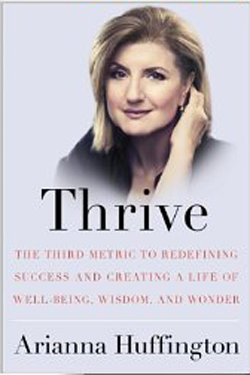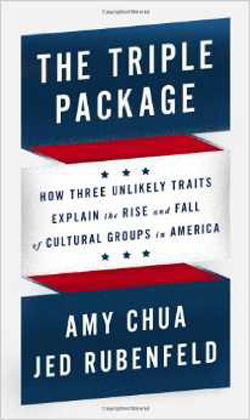As a young woman on the brink of entering the professional world, figuring out what to do with my life, from the grand scheme to the daily routine, is a common topic of discussion and musing.
Arianna Huffington's Thrive book tour made a stop at Yale Law School last week. Along with about fifty other students, I had the pleasure of hearing Huffington and Amy Chua have a conversation on Monday, April 14, 2014. Chua, along with Jed Rubenfeld, her husband and fellow professor at Yale Law School, recently published The Triple Package: How Three Unlikely Traits Explain the Rise and Fall of Cultural Groups in America. Two successful women who have both careers and families (and before feminists tear my head off, let me acknowledge that these two are not everyone's goals, but they happen to be mine) talking about life -- what better advisers could I have? The two spoke about redefining success and what it takes to get there.
Huffington emphasized the four pillars that make up her conception of the Third Metric, namely wellbeing, wisdom, wonder, and giving. Together they decrease stress, make our lives more pleasant, and thus allow us to be more efficient, productive, and purposeful.
We should take care of our minds and bodies by getting enough sleep, eating well, meditating and breathing, walking and other exercise, making sure to swap autopilot for mindfulness, and routinely unplugging from technology.
Wisdom takes the form of being aware of how we think and react. There is no magic bullet that imparts wisdom. Huffington urges us to evaluate our lives and our thoughts, emphasizing that sometimes the appropriate response is a stoic "so what?" and that we should be afraid of trusting our intuitions. We should be thankful and positive, and this outlook on life will ease the daily grind.
Huffington urges us to hang on to our child-like sense of wonder. She points to nature and art. Appreciate the beauty around you.
Compassion and empathy lead to Huffington's last theme: giving and volunteering. We can better our lives by helping others.
Living life as it should be lived, however, requires a great deal of discipline--akin to the impulse control trait that Chua believes is one of three that explain why some cultural groups do better than others in America. Huffington highlights obvious things that make our lives more satisfying; the difficult part is making them a part of our day. Huffington peppers Thrive with inspiring quotes and ends each chapter with a list of "baby steps" we can take to meet our goals. Bad habits have to be replaced by good ones.
Another point of commonality that Huffington and Chua discussed was self-criticism. For Huffington, it is "the obnoxious roommate" in her head who is always putting her down. Chua identifies insecurity as a third of what creates drive in some people, but is also careful to note that this trait has a dark underside. Both women agreed that there is a healthy level of self-criticism: that "the obnoxious roommate" must be controlled, but not necessarily silenced.
In some sense, even though Chua's The Triple Package is about the success of cultural groups based on, she openly admits, the superficial measures of wealth and power, it dovetails with Huffington's Thrive. Huffington's conception of the Third Metric in Thrive complements the three qualities of the Triple Package (superiority, insecurity, impulse control). The Triple Package offers an account of how some groups have climbed the ladder of conventional success. Thrive is the next step; the kicking away of the ladder to redefine what your life will mean.
Two images, one from each of their books, illustrate this point. Huffington contrasts a resume with a eulogy (Huffington page 15). When people die, their lives are remembered in a specific way. People do not speak of company profits and hours billed, but of relationships and spirit. The Triple Package explains our resume while the Third Metric advises us on living a life that makes for a good eulogy.
Chua quotes from James Truslow Adams to distinguish the issues: "There are obviously two educations. One should teach us how to make a living and the other how to live" (Chua page 18). The Triple Package reveals qualities that may explain drive and conventional success while the Third Metric asks about living a balanced life and personal satisfaction.
The Third Metric is an addendum to the Triple Package. As the term implies, it does not totally replace other measures of success; it adds to them. The Third Metric complicates the story of success and perhaps phrases the question in terms of happiness rather than just achievement.
The Third Metric can be thought of as the culmination of the Triple Package arc. As careers solidify, as people get older, people begin to question their lives and break free of conventional measures of achievement. But Huffington is probably right to say that we can achieve greater success and happiness earlier on, all the while building up our careers and lives. By being balanced individuals, we can actually achieve more.
Listening to Huffington and Chua grapple with questions about the meaning of success and fulfillment both validated the quest, something forgotten when mainstream American society focuses on wealth and power as the only measures of achievement, and helped me refine my own views.
It was and is an important conversation to have.